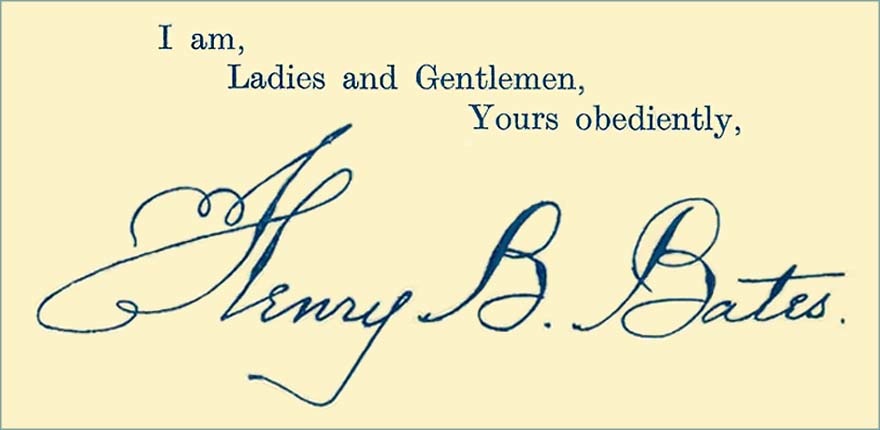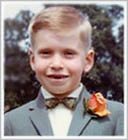An Illustrated History of Old Sutton in St Helens, Lancashire
Part 7 (of 95 parts) - Dr. Henry Baker Bates
Old Sutton in St Helens
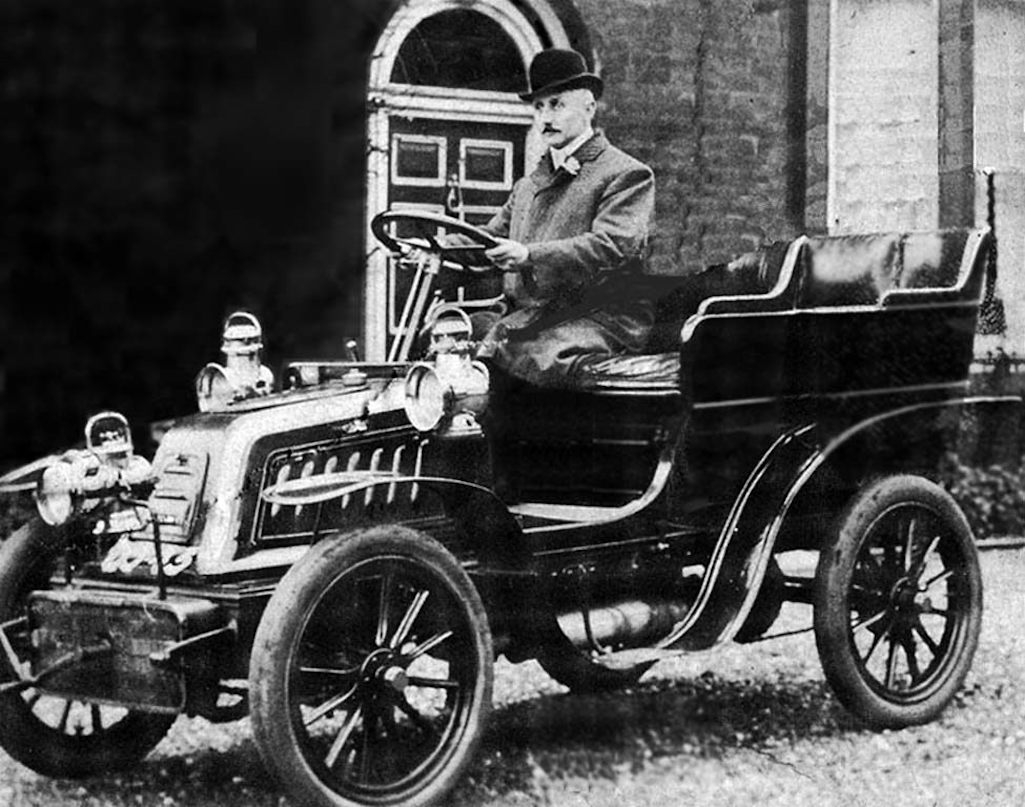
Dr. Henry Baker Bates pictured outside Sutton Hall c.1908 driving his Prunel a Tonneau vehicle

Dr. Bates outside Sutton Hall c.1908 driving his Prunel a Tonneau

Dr. Bates outside Sutton Hall c.1908
Henry would likely have been inspired by his oldest brother, William Richard Bates, who was 12 years older and became a doctor and surgeon with a practice in Addingham, near Skipton, before transferring to Ilkley. Henry’s education took place at the Chatham Institute at 161 Chatham Street in Liverpool, which described itself as a ‘select private school for boys’. In an 1876 advertisement the school boasted of its ‘large and commodious’ schoolroom, which had been ‘constructed on the most approved principles of ventilation …chemical and physical laboratories, lavatory, &c.’ as well as an 120 feet long playground.
Henry then studied at Victoria University and obtained his degrees in medicine, surgery and midwifery in 1891. During the previous year he had undertaken a course in forensic medicine at the University of Liverpool. For nine months prior to qualifying, Henry served as assistant to Dr. Thomas R. Pennington (1843-1891) who had a practice in Junction Lane in Sutton but resided in Liverpool. Bates soon began courting his daughter, Edith Elizabeth Pennington (1870-1908) and in the 1891 census is recorded as a visitor at the Pennington household at 59 Pembroke Place in Liverpool.
Dr. Pennington seems to have commuted to his Sutton surgery from his Liverpool home and shortly after completing his census return on April 5th, died at the young age of 48. Henry was still only a medical student but took over Pennington's practice, receiving his licence as a medical practitioner in June 1891.
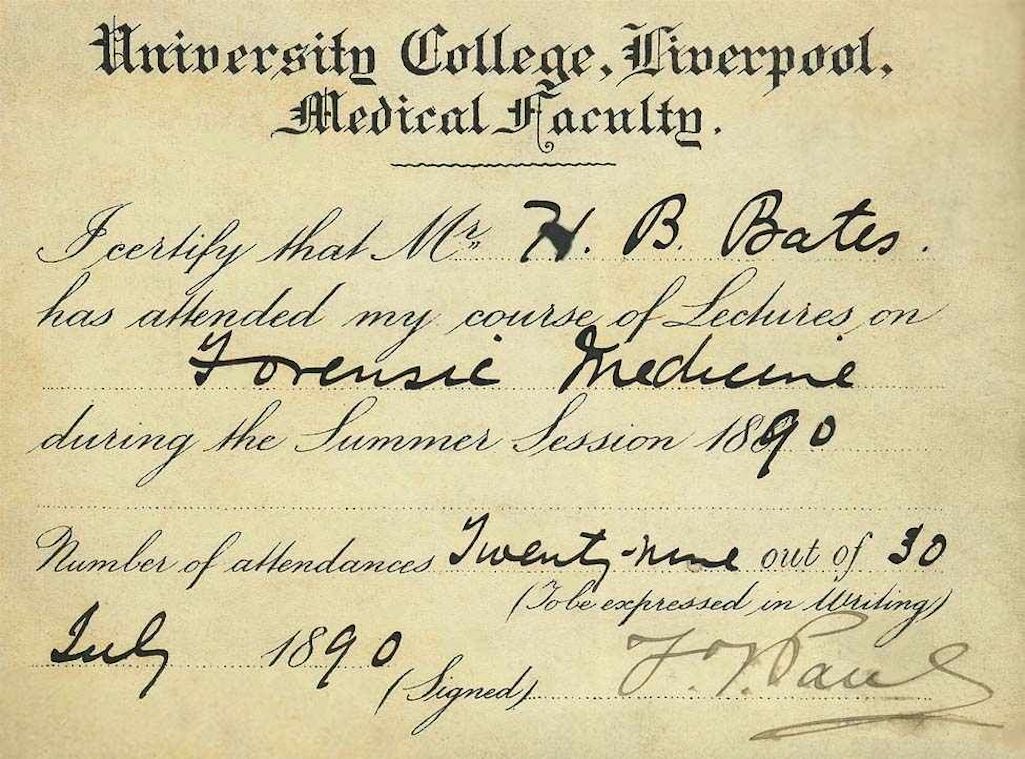
Certificate awarded to Henry Baker Bates by the University of Liverpool - Contributed by Merrick Baker-Bates

Certificate awarded to Henry Bates by the University of Liverpool

Certificate awarded to Henry Bates
Dr. Bates had bought his practice from the executors of Thomas Pennington's estate on August 1st 1891. The initial agreement was that Bates would pay to the executors half of the practice's net receipts. This was then revised to £4 5 shillings per week for five years. However, the gross earnings of his Junction Lane practice were only £8 per week and the young doctor soon found himself in financial trouble. The executors called in the bailiffs and on January 5th, 1893. Bates suffered the indignity of appearing before Liverpool Bankruptcy Court with debts of £1011 and assets of £137 15s 6d. This was an extraordinary event in the young doctor's life as his wife Edith was one of the beneficiaries of her father's estate. So effectively Bates was in part seeking protection in the bankruptcy courts from his own wife!
Henry survived the bankruptcy scandal but learnt that being a doctor in Sutton was unlike to make him wealthy. It was easier to get blood out a stone than some of his patients! On July 1st 1896, Bates appeared at St.Helens County Court claiming £9 19s from William Dixon of Earlestown. This was for non-payment of medical fees for attending his late wife and supplying her with medication. Dixon had separated from his spouse and had inserted a notice in local papers which stated that he would not be responsible for her debts. Upon her death, Dixon received £16 10s insurance money but refused to pay Bates's bill. So the doctor sued him in the county court but the judge ruled in favour of the defendant.
Later in 1896 Thomas Woods, secretary of Sutton Conservative Club, persuaded Dr. Bates to contest East Sutton ward against Charles Walsh in the forthcoming municipal election. Walsh had made quite a name for himself on the Town Council since first becoming a councillor in April 1889, when he replaced incumbent William John Kirkham, who had been disqualified for spending more than six months out of the country. Curiously five months after being elected, Walsh was himself disqualified from voting in local elections and in the Town Council. He ran a draper's shop in Peckers Hill Road and it was discovered that he hadn't paid his rates within the prescribed time. Walsh was, however, able to retain his council seat and by 1896, had put this embarrassment behind him.
Initially some saw Dr. Bates's candidature on behalf of the Conservative party as a joke. The good doctor hadn't lived in the town for long and the Liberal Charles Walsh was renowned for his brilliant debating powers and oratory and had the backing of the East Sutton Ratepayers Association. The St.Helens Newspaper of November 3rd 1896 reported that Walsh's election cries were 'Baths for Sutton', 'Recreation Grounds', 'Better water, better lighting, and better streets' while Dr. Bates asked electors to vote for 'no school board' and 'the winning side'.
Two polling booths were set up on waste land off Sutton Road with the election closing at 8pm. The boxes were sealed and transported to St.Helens Town Hall where a crowd of several thousand gathered. The Newspaper reported that the main interest in the five borough wards where elections were taking place was in Central Ward where a curious battle of the bottle was taking place. Publican Edward Ormesher - who was secretary of the St.Helens Licensed Victuallers' Association - was fighting against leading Liberal and prominent St.Helens temperance worker Joseph B. Leach, the retiring councillor. As the paper reported, it was a solid Liberal ward but 'there was no knowing how the beer element might prevail'. In fact there were three publican candidates, including Mr. H. Bickerstaffe in West Sutton.
The crowd of constituents didn't have too long to wait before the election results were declared. A large staff of counting clerks did the business speedily and at 9.10pm the Mayor appeared on the Town Hall steps with the candidates. Dr. Bates had defeated his rival by a majority of just 57 and Alderman Massey, leader of the Conservative party, was said to have been quite astonished with the young doctor's victory. Charles Walsh blamed his defeat on the Liberal party being "entirely disorganised and almost demolished", although he had also begun his election campaign quite late.
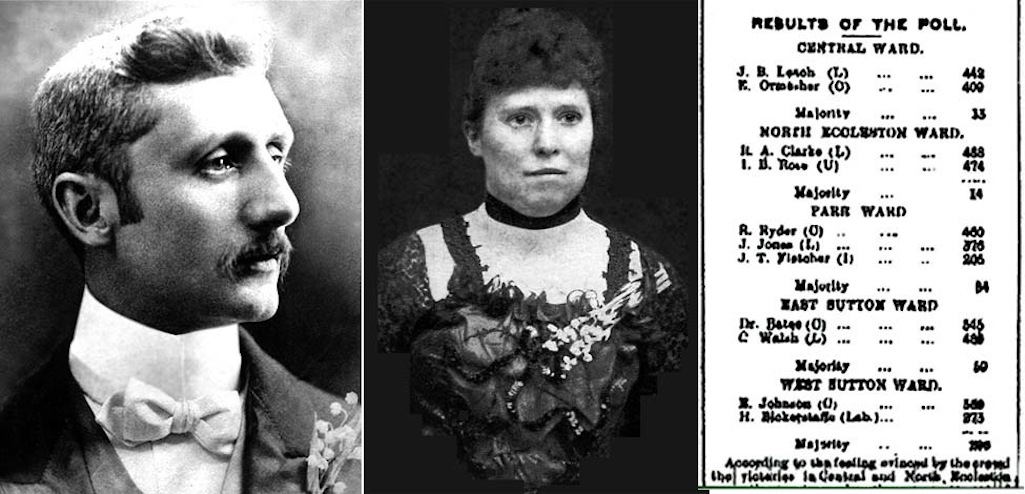
Left: Young Dr. Bates; Middle: Edith Elizabeth Bates née Pennington (1871-1908) Right: St.Helens Newspaper November 3rd 1896

Dr. and Edith Bates and St.Helens Newspaper report from November 3rd 1896

Dr. Henry & Edith Bates and St.Helens Newspaper report from 3/11/1896
As a councillor, Dr. Bates became chairman of St.Helens Corporation's Health Committee, a position that he held for many years. He's credited as a health pioneer for the town and many improvements in the public health services were brought about under his guidance. In April 1899, Bates visited Fecamp in Normandy as a member of a fact-finding deputation and learned that sterilising milk had significantly reduced infant mortality in the French town. As a consequence, St.Helens became the first borough in England to possess a municipal supply of sterilised milk, which was supplied to the people of the town at a specially low rate.
Dr. Bates became heavily involved in the Sutton Conservative Club in Edgeworth Street and helped to get a new building constructed in 1900. Henry probably owned the first motor car in Sutton, believed to be a Prunel A Tonneau. Shortly after the council election, Henry and Edith moved their residence to Leach Hall, the former home of a number of Sutton dignitaries including William Blinkhorn and leased from Captain Michael Hughes. This brought him into contact with the major landowner who wrote to him on September 25th 1906 offering him the position of Sherdley estate agent. His role was to manage all Hughes' estates for the initial salary of £600 per annum (rising to £700), free use of Sutton Hall as his private residence as well as the estate office, plus commission on new estate business. Bates accepted the offer and took up the position on November 1st.
When Sutton residents heard of Dr. Bates' new role, it caused some distress as Suttoners had become dependent upon his medical services. At first he announced that he would be continuing his practice part-time and had engaged Dr. Frederick William Kerr Tough (1878 - 1945) as his partner. However, Captain Hughes insisted on a clause in his terms of employment preventing any other form of work apart from council duties. Incidentally Dr. Tough did take over the Junction Lane practice and he engaged Dr. Bates's brother-in-law Henry W. Pennington as a medical assistant but in April 1913 prosecuted him for embezzlement.
In October 1906 Bates challenged James Seddon, the MP for Newton, to publicly debate the Sarah Cowley Foundation. The event held in St Helens Town Hall was before a crowded audience and was talked about for many years. The St Helens Reporter later described the ‘pitch of excitement’ during the ‘historic debate’ as the:
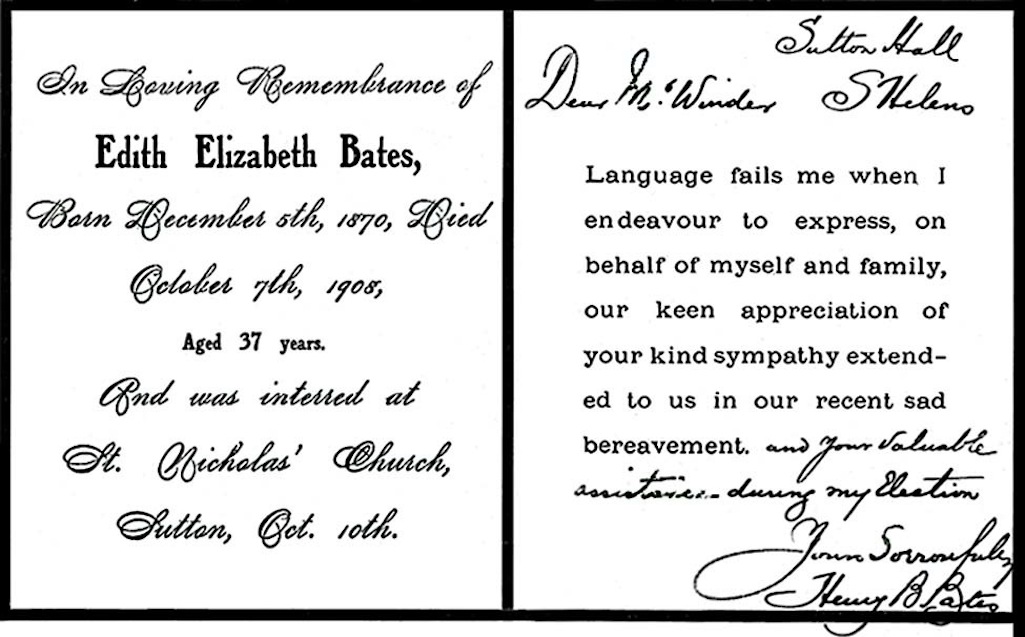
Thank you' card sent to those who had expressed sympathy after Edith's death - Contributed by Merrick Baker-Bates

Card sent to those who had expressed sympathy after Edith Bate’s death

Thank you card sent after Edith's death
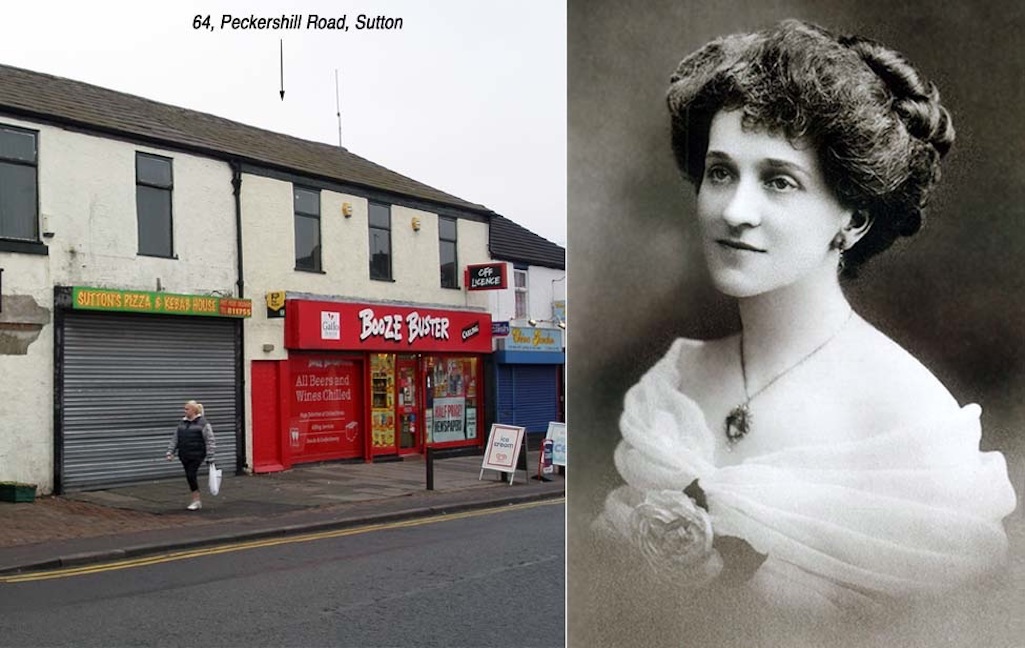
Alice Ann Rigby pictured in 1911. She had previously lived at 64 Peckers Hill Road which in 2009 was one half of Booze Busters

Alice Ann Rigby in 1911 having previously lived at 64 Peckers Hill Road

Alice Ann Rigby pictured in 1911
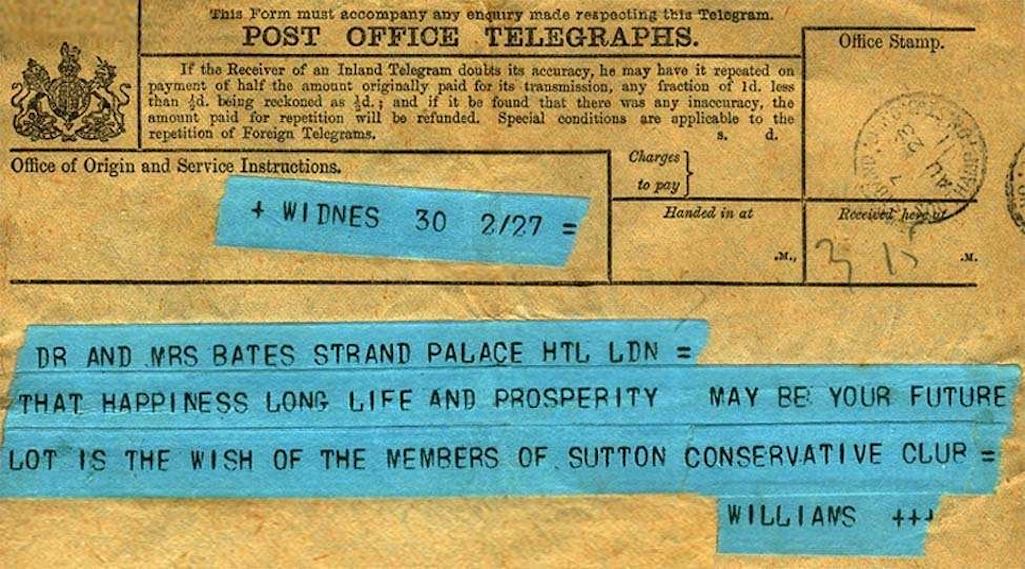
Sutton Conservative Club congratulatory telegram sent on August 23rd 1911 - Contributed by Merrick Baker-Bates

Sutton Conservative Club congratulatory telegram sent on August 23rd 1911

Sutton Conservative Club telegram
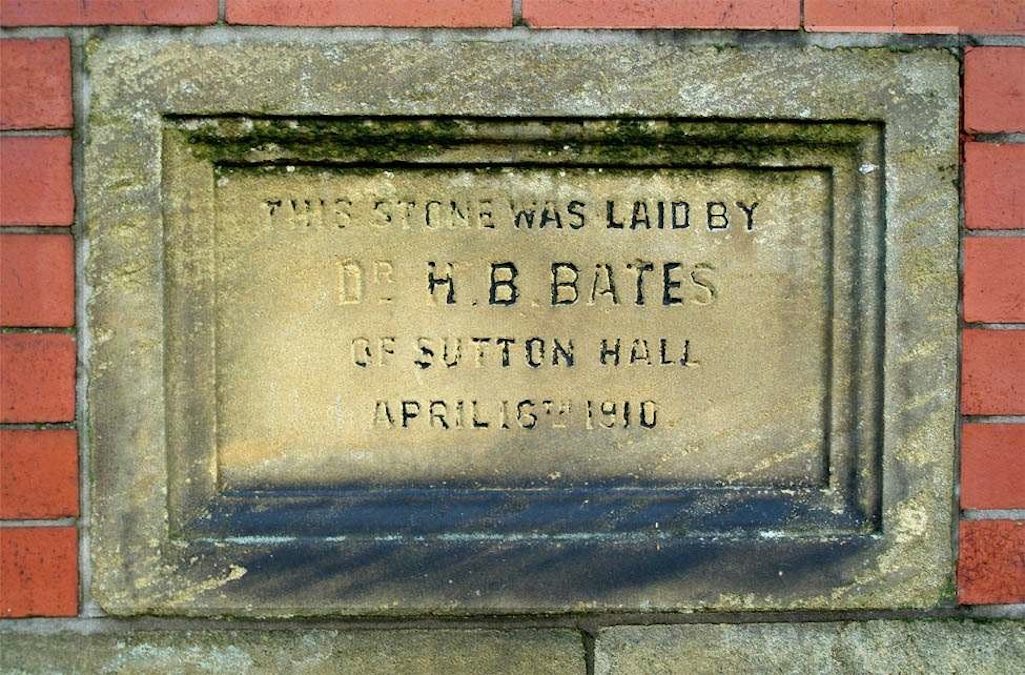
Dr. Bates contributed to the Independent Methodist Chapel's new build in Herbert Street in 1910

Bates contributed to the Independent Methodist Chapel's new build in 1910

Independent Methodist Chapel
The Alderman's work as chairman of the Health Committee was not always appreciated by the citizens of St Helens. In 1915 Dr. Bates caused outrage by despatching a questionnaire - known as a health census - to householders. Despite a number of improvements, many houses were still insanitary and the war had exacerbated problems with overcrowding. This was because many soldier's wives had moved in with their parents or in-laws while their husbands were abroad. The questionnaire was trying to ascertain the state of public health in St Helens by linking it to people's living conditions, employment and wages. However one question that asked householders to state their total earnings had a furious reaction with many refusing to complete the forms. Thousands were left uncollected and the officials charged with their collection received much abuse.
The St Helens branch of the National Union of Railwaymen wrote to the Town Council in protest against the 'inquisitorial and impertinent' form that demanded to know the private affairs of the townspeople. The council discussed the letter on July 7th and Dr. Bates told the meeting that he never dreamt that the census would cause such resentment. Every question had had a distinct bearing on matters of public health but the medical officer was now instructed to stop the collection.
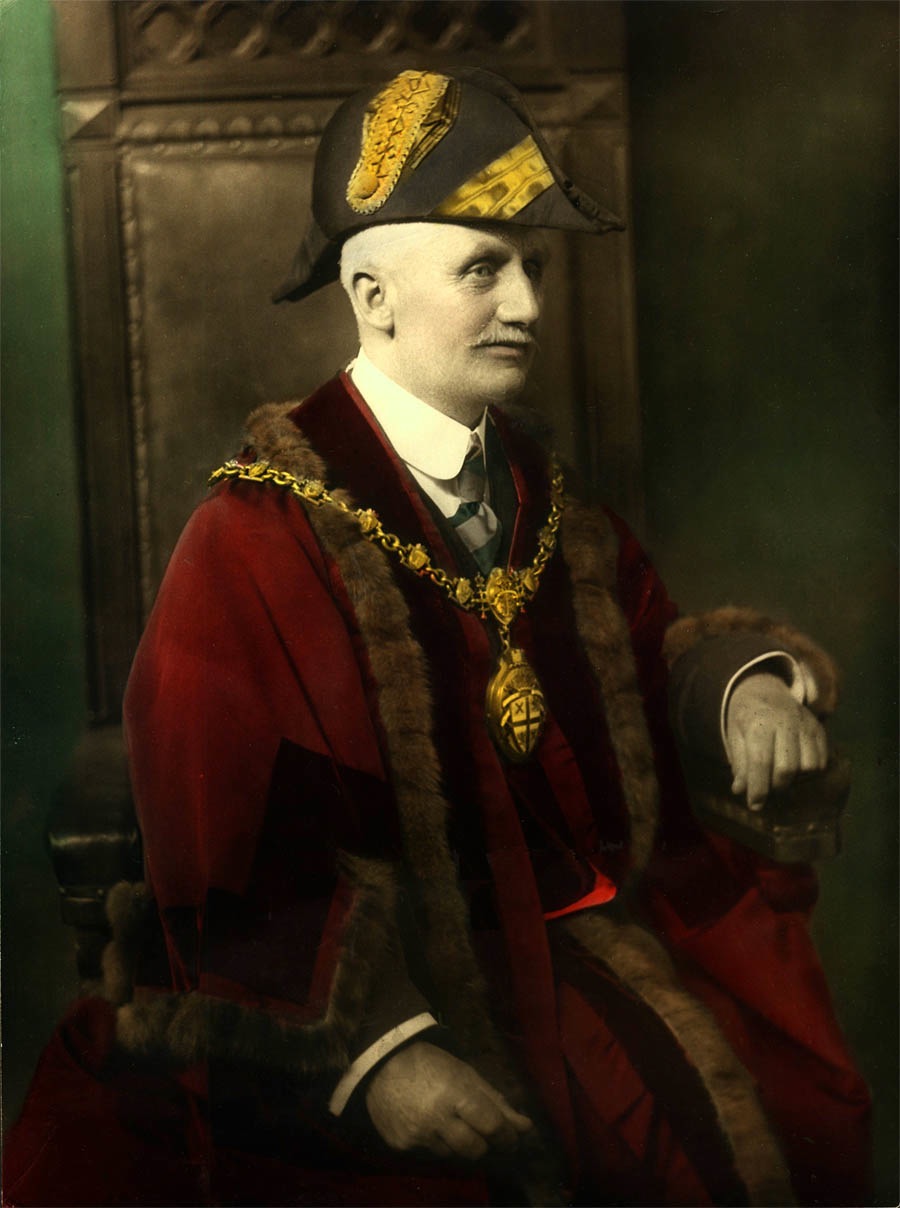
Mayoral portrait of Henry Baker Bates which seems to have been hand coloured - Contributed by Merrick Baker-Bates

Mayoral portrait of Henry Bates which seems to have been hand coloured

Mayoral portrait of Henry Bates
The St Helens Belgian Refugees Committee organised the reception and care of individuals who had fled Belgium in the wake of the German invasion. On December 7th 1914, Bates met a party of 54 Belgians at Liverpool and then journeyed with them to St Helens. They were housed in Cowley Hill Lane in the late Thomas Brewis’s home, which had been converted for their use. Brewis had been a well-known solicitor in St Helens and had served as Town Clerk and magistrates’ clerk.
There was a great deal of sympathy for the Belgians and the Co-operative Society agreed to clothe and feed the refugees for 12 months. They were also offered a free water supply and even hairdressing. In addition Bates was during this period deputy chairman of the Insurance Committee and acting deputy chairman of the Watch Committee and heavily involved in the ‘Smokes for Tommy’ fund and other Red Cross work in association with Edith Hughes of Sherdley Hall.
On October 6th 1915 Dr. Bates was invited by St Helens Town Council to become Mayor of the Borough of St Helens and was formally elected at the annual council meeting on November 9th. It was a time-honoured tradition when new Mayors took their seat in the Police Court that they forgave the first offender that was before them. So six days after election, Bates gave a second chance to a lucky Liverpool woman charged with being drunk in St Helens. It was revealed that many people from the city were commuting to the town as Liverpool's pubs had been closed.
Dr. Bates was re-elected as mayor for three successive years and was dubbed 'the people's mayor' by the St.Helens Newspaper. During his four-year mayoral term, he chaired numerous war charities including the Committee for the United Service Fund, the Sailors and Soldiers Families Association, the War Pensions Committee and a fund in which owners of one-man businesses could become re-established after the war. Lord Daresbury, through Greenall, Whitley, provided £10,000 for this fund. In 1918 Bates was elected leader of the Conservative party in St Helens, upon the death of Col. W. Lee Pilkington. For some years he had been chairman of the Conservative Workingmen's Association and treasurer of the Primrose League.
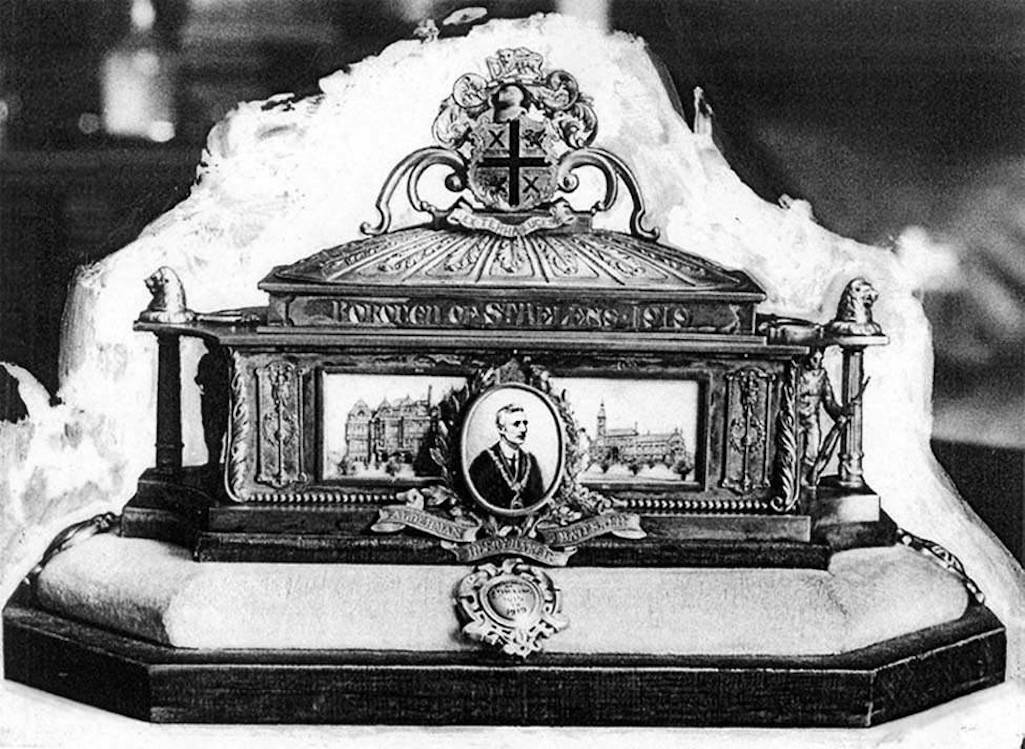
Scroll granting freeman of the borough to Dr. Bates was contained within a silver gilt casket - Contributed by Merrick Baker-Bates

Scroll granting freeman of the borough to Dr. Bates within a silver gilt casket

Scroll granting freeman of the borough was contained within a silver gilt casket
The scroll confirming the award of the freemanship was contained within a silver gilt casket and his widow presented it to the town in 1953 to mark Queen Elizabeth's coronation. Later in the year Dr. Bates was awarded the M.B.E. However 1919 was also a very difficult year for Dr. Bates as his relationship with his boss at Sherdley Hall, Colonel Hughes, finally broke down.
Although Hughes had consented to Dr. Bates becoming Mayor of St Helens for three successive years, he felt that his work as the Sherdley Estate agent was suffering and so he had refused permission for his fourth term. He was also highly critical of his leadership of St Helens Town Council and in a letter to the council (dated 1/10/1918) - which the St Helens Reporter dubbed “amazing” and the St Helens Newspaper called “extraordinary” - Michael Hughes called for Dr. Bates' administration to be replaced by individuals:

Left: Notice by Colonel Hughes in the Liverpool Daily Post of 13/11/1918; Right: St.Helens Reporter's account of the court case

Left: Notice by Colonel Hughes in the Liverpool Daily Post of 13/11/1918; Right: The St.Helens Reporter's account of the court case from 2/5/1919

Notice by Col. Hughes and report in the St.Helens Reporter of the court case
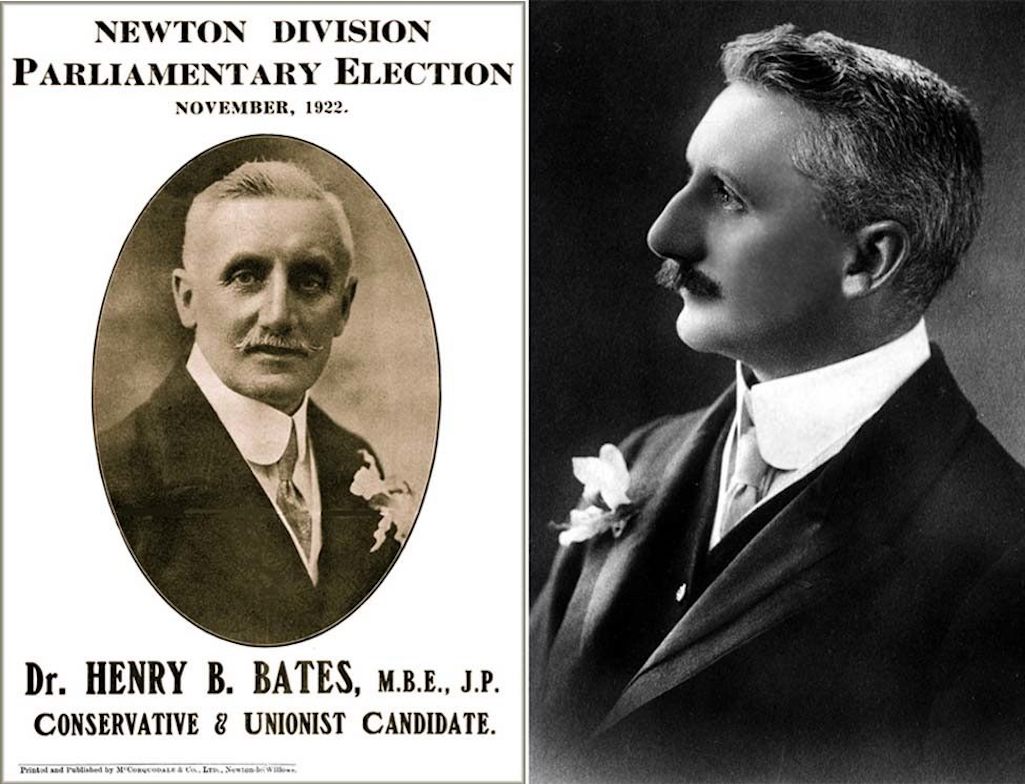
An election leaflet from 1922 and a portrait of the young Henry Baker Bates - Contributed by Merrick Baker-Bates

An election leaflet from 1922 and a portrait of the young Henry Baker Bates

Election leaflet and portrait from 1922
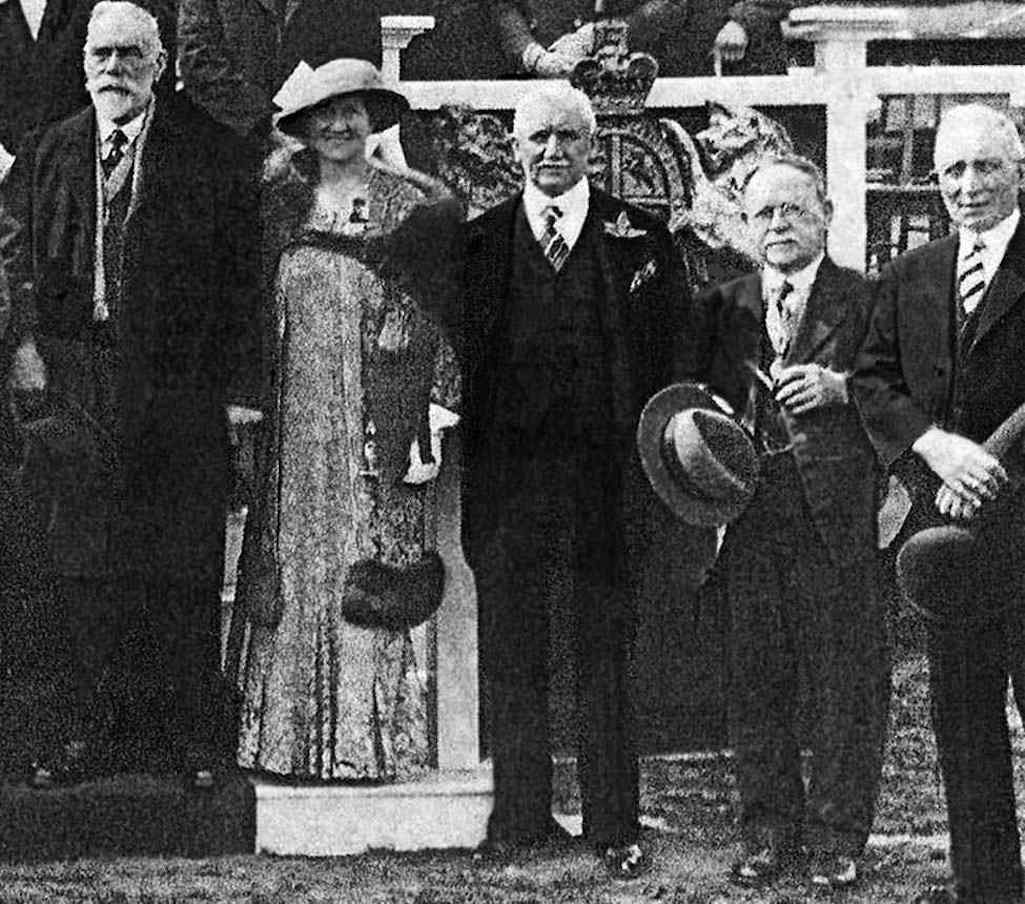
Alice and Henry Baker Bates in 1930 with Sir James Crooks (1858 - 1940) on the far left of the picture

Alice and Henry Baker Bates in 1930 with Sir James Crooks on the far left

Alice and Henry Bates in 1930 with Sir James Crooks (on the far left)
On November 14th 1919 Henry suffered a motor accident when after leaving home for Eccleston he turned out of Prescot Road into Dunriding Lane. His car skidded into a parked brewery vehicle and then shot across the road and broke wooden railings surrounding a garden. Fortunately the former Mayor suffered only bruises and shock. Also that month Ald. Dr. Bates and Alice Bates presented to the town a bronze tablet memorial to the fallen. This is how it was described at a St Helens Town Council meeting:
On April 10th 1928 Henry gave evidence at the 17-day-long inquiry into the conduct of the St.Helens Chief Constable Robert Ellerington. The latter had been in dispute with the Council's Watch Committee and on September 26th 1927 they had issued a resolution forcing him to retire. Parliament ordered a board of inquiry and Dr. Bates stated that the Chief's sole ambition had been to make his force more efficient but some members of the committee had tried to undermine his authority. What wasn't revealed was that the pair were close friends and on one occasion Ellerington had accompanied Bates when the then Sherdley Estate Agent had travelled to Thornham Hall in Suffolk.
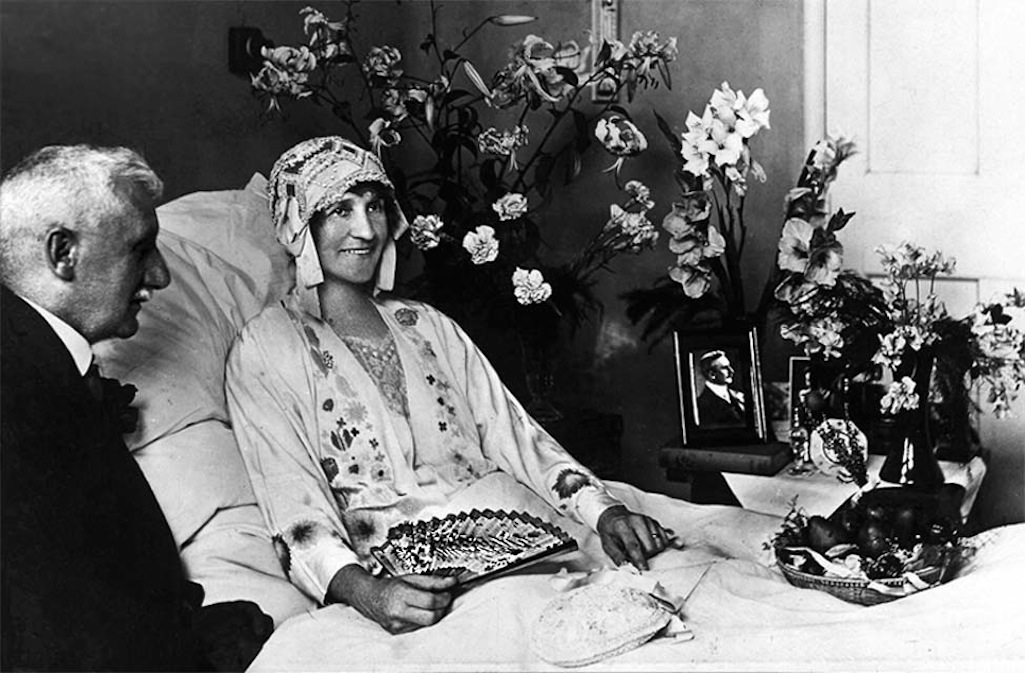
Just why this photograph was taken with Alice Bates in bed isn't known - Contributed by Merrick Baker-Bates

Just why this photograph was taken with Alice Bates in bed isn't known

Henry with wife Alice pictured in bed

Obituaries on Henry Baker Bates both dated 20/11/1940; Left: St.Helens Reporter and right: St.Helens Newspaper

St.Helens newspaper obituaries on Henry Baker Bates both dated 20/11/1940

Newspaper obituaries from 20/11/1940
The St. Helens Reporter declared his death the 'passing of a great leader' who'd played a significant role in shaping St.Helens. The St.Helens Newspaper stated in their report that he'd had a 'great record of public service'. J. G. Atherton of the Soldiers, Sailors and Airmen’s Families Association was quoted as saying that Bates’s passing would leave a ‘despondency in the hearts of thousands of St. Helens parents on whose behalf he did untiring work over a period of many years’.
It's worth mentioning that Dr. Bates is the only individual to have served as Mayor of St.Helens for four years. As these days it's the usual practice to have a different mayor each year, it's likely that Henry's record will never be broken. His medical practice was sold by his widow in November 1940 for £3450 and Alice, the four-times mayoress, outlived her husband by twenty-six years, dying in 1966.
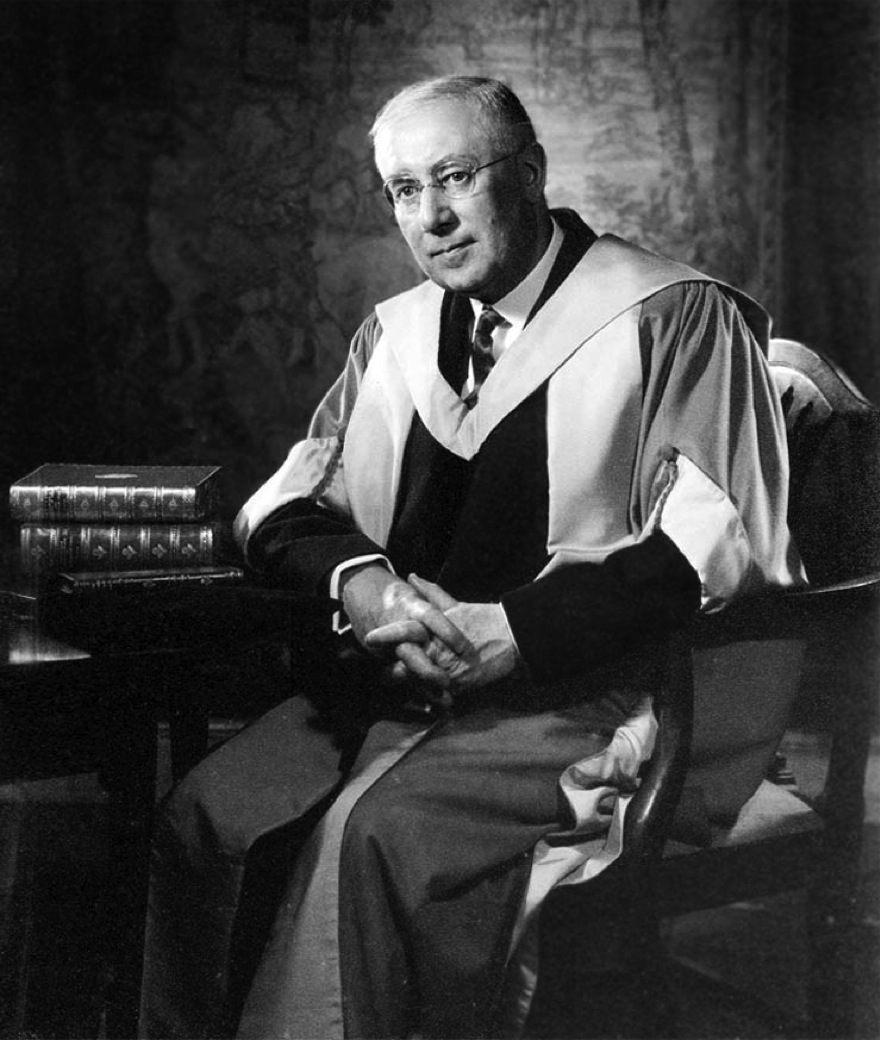
Dr. Eric Baker Bates who was brought up in Sutton Hall - Contributed by Merrick Baker-Bates

Dr. Eric Baker Bates who was brought up in Sutton Hall

Dr. Eric Baker Bates (1905-1986)
Eric is buried with his mother Edith in Sutton Parish churchyard at St.Nicholas. The inscription on his memorial reads 'father, physician, friend, teacher & wit', which was composed by his close friend Father Bernard Eager. However Eric’s father Henry is buried in Rainhill Parish Churchyard with his second wife Alice and on his memorial it says ‘Always service. Never self.’
